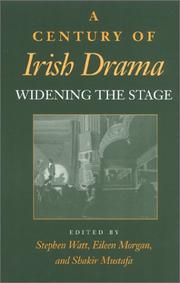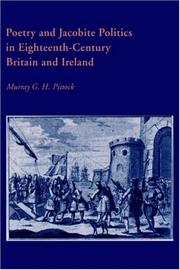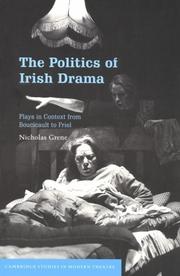| Listing 1 - 4 of 4 |
Sort by
|
Multi
ISSN: 0140895X 02676079 ISBN: 0861402375 9780861402373 Year: 1990 Volume: 36 3 Publisher: Gerrards Cross: Colin Smythe,
Abstract | Keywords | Export | Availability | Bookmark
 Loading...
Loading...Choose an application
- Reference Manager
- EndNote
- RefWorks (Direct export to RefWorks)
Sociology of literature --- English literature --- Thematology --- Ireland --- Authors, Irish --- Politics and literature --- Politics in literature --- Political and social views --- Irish authors --- History and criticism --- History --- In literature --- Authors, Irish - Political and social views --- English literature - Irish authors - History and criticism --- Politics and literature - Ireland - History --- Ireland - In literature

ISBN: 0253338123 025321419X 9780253214195 9780253338129 Year: 2000 Publisher: Bloomington: Indiana university press,
Abstract | Keywords | Export | Availability | Bookmark
 Loading...
Loading...Choose an application
- Reference Manager
- EndNote
- RefWorks (Direct export to RefWorks)
English drama --- Theater --- Politics and literature --- Nationalism and literature --- Irish authors --- History and criticism --- History --- English drama - Irish authors - History and criticism - Congresses --- English drama - 20th century - History and criticism - Congresses --- Theater - Ireland - History - 20th century - Congresses --- Politics and literature - Ireland - History - 20th century - Congresses --- Nationalism and literature - Ireland - History - 20th century - Congresses

ISBN: 0521410924 0521030277 1139085271 0511519095 Year: 1994 Publisher: Cambridge New York ; Melbourne Cambridge University Press
Abstract | Keywords | Export | Availability | Bookmark
 Loading...
Loading...Choose an application
- Reference Manager
- EndNote
- RefWorks (Direct export to RefWorks)
The aim of this book is to question assumptions about the nature of the Augustan era through an exploration of Jacobite ideology. Taking as its starting point the fundamental ambivalence of the Augustan concept the author studies canonical and non-canonical literature and uncovers the 'four nations' literary history of the period defined in terms of a struggle for control of the language of authority between Jacobite and Hanoverian writers. This struggle is seen to have crystallized Irish and Scottish opposition to the British state. The Jacobite cause generated powerful popular literature and the sources explored include ballads, broadsides and writing in Scots, Irish, Welsh and Gaelic. The author concludes that the literary history we inherit is built on the political outcome of the Revolution of 1688.
Politics and literature --- Great Britain --- History --- 18th century --- Popular literature --- History and criticism --- Politics and government --- Ireland --- English literature --- Theory, etc. --- Politics and literature - Ireland - History - 18th century. --- Ireland - Politics and government - 18th century. --- Arts and Humanities --- Literature --- Celtic literature --- Canon (Literature) --- History and criticism. --- Classics, Literary --- Literary canon --- Literary classics --- Best books --- Criticism --- Literature, Popular --- Books and reading --- Popular culture --- Literature and politics --- Political aspects

ISBN: 0521660513 0521665361 110711781X 051100947X 0511117906 0511324685 0511150474 0511486022 128015392X 051104853X 9780511009471 051103329X 9780511033292 9780511150470 9780511117909 9780521665360 9780521660518 9780511486029 0511086792 Year: 1999 Volume: *6 Publisher: Cambridge : Cambridge university press,
Abstract | Keywords | Export | Availability | Bookmark
 Loading...
Loading...Choose an application
- Reference Manager
- EndNote
- RefWorks (Direct export to RefWorks)
In this book Nicholas Grene explores political contexts for some of the outstanding Irish plays from the nineteenth century to the contemporary period. The politics of Irish drama have previously been considered primarily the politics of national self-expression. Here it is argued that Irish plays, in their self-conscious representation of the otherness of Ireland, are outwardly directed towards audiences both at home and abroad. The political dynamics of such relations between plays and audiences is the book's multiple subject: the stage interpretation of Ireland from The Shaughraun to Translations; the contentious stage images of Yeats, Gregory and Synge; reactions to revolution from O'Casey to Behan; the post-colonial worlds of Purgatory and All that Fall; the imagined Irelands of Friel and Murphy, McGuinness and Barry. With its fundamental reconception of the politics of Irish drama, this book represents an alternative view of the phenomenon of Irish drama itself.
English literature
---
Drama
---
anno 1800-1999
---
Ireland
---
English drama
---
-Political plays, English
---
-Politics and literature
---
-Theater
---
-#BIBC:ruil
| Listing 1 - 4 of 4 |
Sort by
|

 Search
Search Feedback
Feedback About UniCat
About UniCat  Help
Help News
News